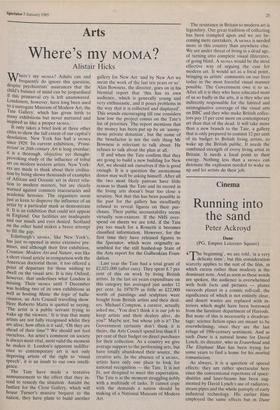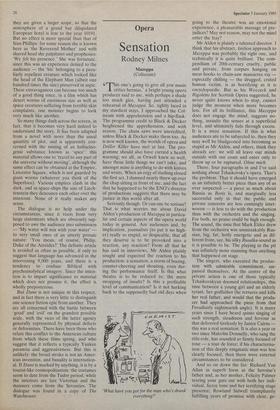Cinema
Running into the sand
Peter Ackroyd
Dune (PG, Empire Leicester Square)
P.T.Ihe beginning', we are told, 'is a very
delicate time'; but this consideration scarcely applies to the rest of the film, in which excess rather than modesty is the dominant note. And as soon as these words are spoken, the audience is overwhelmed with both facts and pictures — planet succeeds planet in a cosmic roll-call, the significance of which is not entirely clear, and desert wastes are replaced with in- teriors which might have been borrowed from the furniture department of Harrods. But none of this is necessarily a disadvan- tage: science fiction epics are meant to be overwhelming, since they are the last refuge of 19th-century sentiment. And as such Dune is a natural home for David Lynch, its director, who in Eraserhead and The Elephant Man has been trying for some years to find a home for his morbid romanticism.
As always, it is a question of special effects: they are rather spectacular here since the conventional repertoire of space- shuttles and laser-beams has been aug- mented by David Lynch's use of radiators, steam-pipes and the whole panoply of early industrial technology. His earlier films employed the same effects but in Dune they are given a larger scope, so that the atmosphere of a grand but dilapidated European hotel is lent to the year 10191. But no effect is more special than that of Sian Phillips: for some reason she is known here as 'the Reverend Mother' and with
shaved head she palpitates and prophesies: 'We felt his presence.' She was fortunate, since this was an experience denied to the audience — the 'his' belonging to a pecu- liarly repellent creature which looked like the head of the Elephant Man (albeit one hundred times the size) preserved in aspic. These extravagances can become too much of a good thing since, in a film which has desert worms of enormous size as well as space creatures suffering from terrible skin complaints, one monster begins to look very much like another.
So many things dash across the screen, in fact, that it becomes very hard indeed to understand the story. It has been adapted from a novel with more than the usual quantity of plot, and is apparently con- cerned with the mining of an hallucino- genic substance known as 'spice': this material allows one to 'travel to any part of the universe without moving', although the same effect can be obtained at the Empire, Leicester Square, which is not guarded by giant worms (whatever you think of the Superloos). Various empires clash in the dark, and in space-ships the size of Liech- tenstein they denounce each other over the intercom. None of it really makes any sense.
The dialogue is no help under the circumstances, since it veers from very large statements which are obviously sup- posed to awe the audience into submission — 'My water will mix with your water' — to very small ones of an utterly prosaic nature: 'You mean, of course, Philip, Duke of the Atreides?' The definite article is avoided as often as possible, if only to suggest that language has advanced in the intervening 9,000 years, and there is a tendency to confuse Biblical with psychoanalytical imagery. Since the inten- tion is to impart significance to material which does not possess it, the effect is wholly preposterous.
But Dune is not unique in this respect, and in fact there is very little to distinguish one science fiction epic from another. They are all concerned with the battle between 'good' and 'evil' on the grandest possible scale, with the vices of the latter agency generally represented by physical defects or deformities. There have been those who relate this conflict to the American culture from which these films spring, and who suggest that it reflects a typically Yankee paranoia and aggressiveness. But this is unlikely: the broad stroke is not an Amer- ican invention, and banality is internation- al. If Dune is marked by anything, it is by a tourist-like cosmopolitanism: the costumes seem to date from the Tudor period, while the interiors are late Victorian and the manners come from the Seventies. The dialogue was found in a copy of The Watchtower.







































 Previous page
Previous page